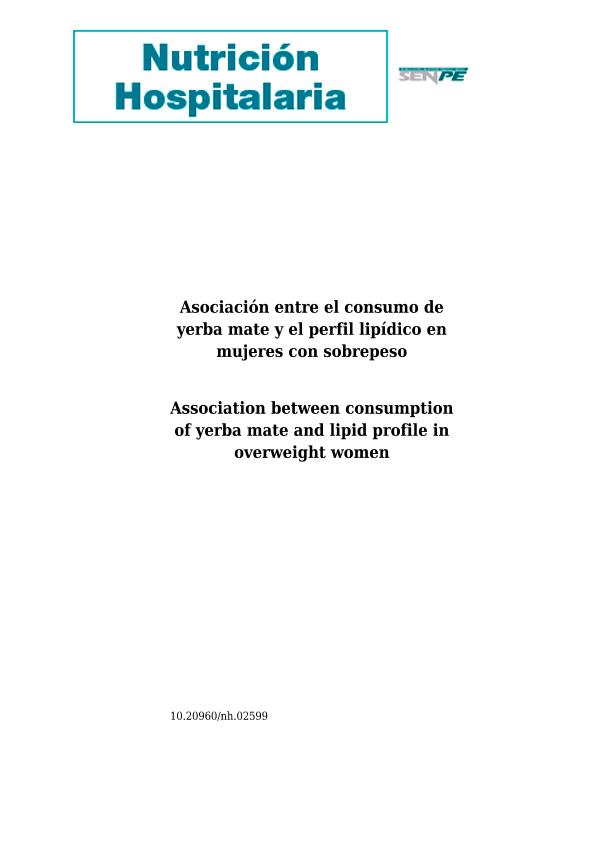Artículo
Introducción: la yerba mate es una bebida tradicional consumida en Sudamérica, producida de hojas tostadas de Ilex paraguariensis. Varios estudios han demostrado sus propiedades hipolipemiantes debido a la presencia de polifenoles y saponinas. Objetivo: analizar el efecto del consumo diario de yerba mate sobre los valores de lípidos séricos y la composición corporal en mujeres con sobrepeso. Métodos: 119 mujeres con sobrepeso de entre 25 y 50 años fueron divididas en tres grupos: mate y dieta (MD), mate sin dieta (M) y agua y dieta (AD). Durante 12 semanas se suplementaron con mate los grupos M y MD, mientras que los grupos AD y MD, mantuvieron un plan alimentario hipocalórico. Se realizaron mediciones antropométricas y análisis de sangre (colesterol total, colesterol-LDL, colesterol-HDL y triglicéridos) al inicio y la finalización del estudio. El análisis estadístico se realizó mediante la prueba t de Student o la prueba de Wilcoxon para muestras pareadas y ANOVA (p < 0,05 en todos los casos). Resultados: el colesterol total disminuyó en todos los grupos (10,21 mg/dl en MD, 18,29 mg/dl en M y 17,63 mg/dl en AD, sin diferencias entre grupos). El colesterol-LDL disminuyó en ambos grupos tratados con mate (8,07 mg/dl en MD, 16,04 mg/dl en M, sin diferencias entre grupos) mientras que colesterol-HDL decreció en el grupo M (2,09 mg/dl). Por otro lado, los triglicéridos disminuyeron 10,74 mg/dl solo en el grupo MD. Conclusiones: la ingesta diaria de mate ayuda a reducir el colesterol total y el colesterol-LDL, y reduce los triglicéridos junto a una dieta baja en calorías. Introduction: yerba mate is a traditional drink consumed in South America, produced from toasted leaves of Ilex paraguariensis. Several studies have demonstrated its lipid-lowering properties due to the presence of polyphenols and saponins. Objective: to analyze the effect of daily yerba mate consumption on the values of serum lipids and body composition in overweight women. Methods: 119 overweight women between 25 and 50 years were divided into three groups: Mate and Diet (MD), Mate without Diet (M), and Water and Diet (AD). For 12 weeks the M and MD groups were supplemented with mate, while the AD and MD groups maintained a hypocaloric food plan. Anthropometric measurements and blood tests (total cholesterol, LDL-cholesterol, HDL-cholesterol and triglycerides) were taken at the beginning and at the end of the study. The statistical analysis was performed using Student's t-test or Wilcoxon's test for paired samples and ANOVA (p < 0.05 was considered significant in all cases). Results: total cholesterol decreased in all groups (10.21 mg/dL in MD, 18.29 mg/dL in M, and 17.63 mg/dL in AD, without differences between groups). LDL-cholesterol decreased in both groups with mate (8.07 mg/dL in MD, 16.04 mg/dL in M, without differences between groups) while HDL-cholesterol decreased in M (2.09 mg/dL). On the other hand, triglycerides fell 10.74 mg/dL in the MD group. Conclusions: a daily intake of mate helps reduce total cholesterol and LDL-cholesterol, and provides a reduction of triglycerides along with a low-calorie diet.
Asociación entre el consumo de yerba mate y el perfil lipídico en mujeres con sobrepeso
Título:
Association between consumption of yerba mate and lipid profile in overweight women
Avena Alvarez, María Virginia; Messina, Diego ; Corte, Carla Antonella; Mussi Stoizik, Jessica Anabella; Saez, Aldana Celeste; Boarelli, Paola Vanina
; Corte, Carla Antonella; Mussi Stoizik, Jessica Anabella; Saez, Aldana Celeste; Boarelli, Paola Vanina ; Perez Elizalde, Rafael Fernando
; Perez Elizalde, Rafael Fernando
 ; Corte, Carla Antonella; Mussi Stoizik, Jessica Anabella; Saez, Aldana Celeste; Boarelli, Paola Vanina
; Corte, Carla Antonella; Mussi Stoizik, Jessica Anabella; Saez, Aldana Celeste; Boarelli, Paola Vanina ; Perez Elizalde, Rafael Fernando
; Perez Elizalde, Rafael Fernando
Fecha de publicación:
10/2019
Editorial:
Aula Médica Ediciones
Revista:
Nutrición Hospitalaria
ISSN:
0212-1611
Idioma:
Español
Tipo de recurso:
Artículo publicado
Clasificación temática:
Resumen
Palabras clave:
ILEX PARAGUARIENSIS
,
OBESIDAD
,
DISLIPIDEMIA
,
COLESTEROL
Archivos asociados
Licencia
Identificadores
Colecciones
Articulos(IHEM)
Articulos de INST. HISTOLOGIA Y EMBRIOLOGIA DE MEND DR.M.BURGOS
Articulos de INST. HISTOLOGIA Y EMBRIOLOGIA DE MEND DR.M.BURGOS
Citación
Avena Alvarez, María Virginia; Messina, Diego; Corte, Carla Antonella; Mussi Stoizik, Jessica Anabella; Saez, Aldana Celeste; et al.; Asociación entre el consumo de yerba mate y el perfil lipídico en mujeres con sobrepeso; Aula Médica Ediciones; Nutrición Hospitalaria; 36; 6; 10-2019; 1300-1306
Compartir
Altmétricas



